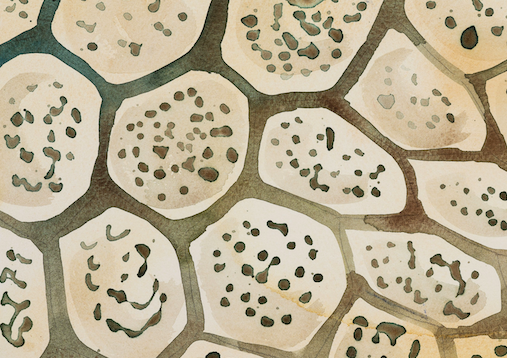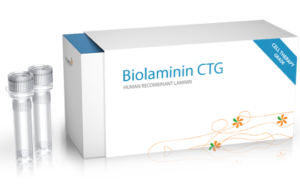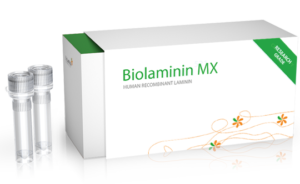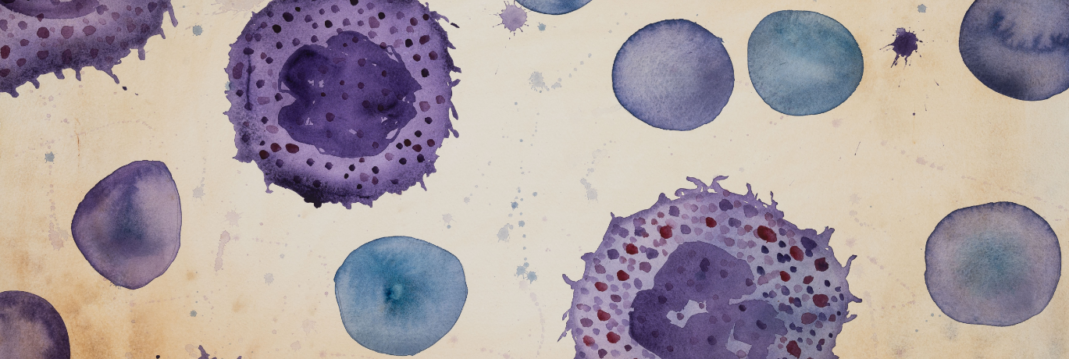Clinical applications and large-scale cell production

Biolaminin substrates for large-scale manufacturing and clinical use
Scaling up high-quality cell production for clinical needs
A scalable system for pluripotent stem cell culture and differentiation is required to produce the cells in quantities that meet clinical needs. In addition to quantity, the production process needs to be in compliance with good manufacturing practices (GMP) and allow the culture to be carried out under defined, serum-free and xeno-free conditions.
Many established 2D culture systems do not fulfill these demands due to their restricted surface area to volume ratio. Despite the development of stacked systems, the amount of time required for manual passaging, inherent variability between setups, limited potential for online control of cultivation parameters, and low cell yields remain challenges.
Cell culture in bioreactors represents the most favorable culture method for large-scale production in terms of scalability, simple design, and straightforward handling (feeding and harvesting). It offers the control of cell density and distribution with online monitoring of culture conditions (pH, temperature, dO2, dCO2, agitation) which enables a homogeneous distribution of nutrients.
Laminins are known to modulate cell differentiation and phenotype stability, support cell adhesion, and inhibit apoptosis. Biolaminin 521 has been shown to facilitate the adhesion of a variety of cell types and to bind to micro-and macrocarrier beads in different types of bioreactors. Therefore, a system with Biolaminin 521 coated beads is a powerful tool for the large-scale manufacturing of cells needed for different clinical applications.
Biolaminin coating on microcarriers and hollow fibers streamlines cell expansion in bioreactor systems
Biolaminin 521 coated microcarrier systems can be easily scaled up in dynamic large-scale culture systems such as stirred bioreactors due to their 3D suspended nature in which high volumetric cell yields are achieved due to better oxygenation, better metabolite mass transport, and limited microenvironment toxicity. In comparison to monolayer culture, this system allows cost-effective, GMP-compliant production of large amounts of clinical-grade hPSC with consistent and predictable characteristics to achieve the needs in developing cellular therapy.
A bioreactor system with Biolaminin-521 coated microcarriers was reported to offer a GMP-compatible and scalable bioprocessing platform to produce human embryonic stem cells (hESCs) with the quantity and quality compliant for clinical applications (Lam et al. 2015). BioLaminin 521 coated microcarriers efficiently supported hESC attachment, spreading, and growth in agitated conditions, without the need for additional positive charges. Importantly, the cultured cells maintained pluripotency for more than 10 passages and retained normal karyotype. The cells were able to differentiate into lineages of all three germ layers and then specifically to cardiomyocytes.
A chemically defined method, utilizing Biolaminin 521 and microcarrier-based suspension culture, was applied to scale up red blood cell (RBC) production (Sivalingam et al. 2018, Sivalingam et al. 2020). The improved cell survival and the better quality process resulted in significant improvement in hematopoietic precursor expansion and RBC yield compared to a conventional embryoid body-based method. Many of the previously used methods are also dependent on a xenogeneic extracellular matrix or co-culture systems and, therefore, this work provided important data on the way to clinical development.
The Biolaminin 521 coated microcarrier beads in stirred bioreactors were also shown to increase megakaryocyte production per iPSC by up to 10-fold (Eicke et al. 2018). Megakaryocytes are the precursors of platelets and they can be used for platelet production, as well as a source for platelet-derived growth factors. Megakaryocytes obtained with this system showed typical features of mature cells and were able to produce platelets in vitro and in vivo. The possibility to use freshly produced platelets in large numbers will facilitate the development of megakaryocyte-based therapeutic strategies.
Quantum Cell Expansion System (QES) coated with Biolaminin 521 was shown to provide the necessary environment for exponential induced pluripotent stem cell (iPSC) growth (Mesquita et al. 2019). Exponential iPSC growth was not observed when vitronectin coating was used in the QES, even though media consumption was the same under both conditions. This indicates that the coating has an important effect on the proliferation rate of the cells. The QES is a closed system bioreactor with a disposable cell expansion set containing hollow fibers. The Biolaminin 521 coated QES can even reach the high cell numbers required for engineering a human-sized bioartificial organ under controlled and xeno-free conditions for clinical purposes.
Cell Therapy Grade (CTG) laminin in clinical trials
BioLamina obtained its first ISO 9001 in 2013 and our quality work has continued ever since. In the Quality Management System today, much of the effort goes into maintaining traceability of processes and raw materials for all our products, a requirement that we know is important for many of our customers.
Our Biolaminin CTG (Cell Therapy Grade) products are designed to enable qualification for use in the manufacturing of cell-based Advanced Therapy Medicinal Products (ATMP). This Biolaminin is provided with all necessary supporting documentation for regulatory filings, such as Certificate of Analysis and Animal Origin Free Statement. GMP Master Cell Bank for this product has been thoroughly virus tested according to ICH viral safety evaluation guidelines, in addition to the standard assessments for sterility, mycoplasma, and endotoxins. Furthermore, the formulation and production process of this product is free of any animal-derived components to the secondary level1), which further facilitates use in the clinical setting. Our products have already been used in clinical trials globally, and our quality aim is to create products that are accepted by all relevant regulatory authorities.
In order to meet the demand of the continuously growing market and to improve our production efficiency, BioLamina has developed a scalable process that utilizes bioreactors and a high throughput chromatographic assembly. Importantly, biopharma-compliant single-use bioprocessing strategies are applied to the entire upscale process.
1) ISCT guidance document “ISCT Animal-Free Origin Survey Results-Summary”
Succeed with your application
-
Application note 018: Large-scale cell production
Clinically adaptable Biolaminin cell adhesion coating for higher yield in bioreactor systems
Open pdf -
Other10/06/2021
Quality documents
Quality documents Quality certifications ISO 9001 certificate Safety data sheets Biosilk (BS)Biosilk
-
Improved Human Pluripotent Stem Cell Attachment and Spreading on Xeno-Free Laminin-521-Coated Microcarriers Results in Efficient Growth in Agitated Cultures
Alan Tin-Lun Lam, Jian Li, Allen Kuan-Liang Chen, William R Birch, Shaul Reuveny, Steve Kah-Weng Oh. Biores Open Access, 2015
Read more -
Laminin as a Potent Substrate for Large-Scale Expansion of Human Induced Pluripotent Stem Cells in a Closed Cell Expansion System
Fernanda C. Paccola Mesquita, Camila Hochman-Mendez, Jacquelynn Morrissey, Luiz C. Sampaio, Doris A. Taylor. Stem Cells Int, 2019
Read more -
Superior Red Blood Cell Generation from Human Pluripotent Stem Cells Through a Novel Microcarrier-Based Embryoid Body Platform
Sivalingam J., Lam A.T., Chen H.Y., Yang B.X., Chen A.K., Reuveny S., Loh Y.H, Oh S.K. Tissue Eng Part C Methods, 2016
Read more -
Large-scale production of megakaryocytes in microcarrier supported stirred suspension bioreactors
Eicke D., Baigger A., Schulze K., Latham S.L., Halloin C., Zweigerdt R., Guzman C.A., Blasczyk R., Figueiredo C.Scientific reports, 2018
Read more -
Application note 015: Cell therapy grade Biolaminin 521 CTG
Features of the Biolaminin CTG product designed for clinical use
Open pdf
Biolaminin Key Advantages
All Biolaminin products are recombinant, full-length, defined, xeno-free laminins. The Biolaminin CTG products are designed to comply even with strict clinical demands.
Biolaminin matrices allow efficient pluripotent stem cell culture on several types of surfaces. Biolaminin coating for cell attachment and growth in different bioreactor systems improves large-scale expansion in defined serum-free conditions. The expanded cells show self-renewal capability and high expression of pluripotent markers. Different Biolaminin isoforms can support the differentiation and expansion of specialized cell types.
Biolaminin products can be adapted to several different bioreactor and culture system platforms. Increased Biolaminin-coated surface areas with improved cell adherence provide large amounts of clinical-grade pluripotent stem cells. Scaling up your process helps you to make more experiments or more therapeutic cells both easily and fast.
Our products have consistent composition and quality. This enables minimized variability between experiments and uniform pluripotency gene expression profiles between different cell lines.
All our matrices are chemically defined and animal origin-free, which makes them ideal substrates for each level of the scientific process – from basic research to clinical applications.
Specific laminin isoforms are present in different tissue microenvironments and are essential for cell survival, proliferation, and differentiation. Biolaminin products allow you to imitate the natural cell-matrix interactions in vitro.
Numerous scientists have found our products and finally succeeded in their specific stem cell application. The power of full-length laminins incorporated into various cell systems is well documented in scientific articles and clinical trials.
Recommended products
-

Biolaminin 521 CTG (CT521)
Human recombinant laminin 521
Biolaminin 521 CTG is a full-length, human, recombinant laminin 521 substrate, the only one of its kind on the market, providing an optimal environment for feeder-free culture of human PSCs, MSCs and most anchorage-dependent progenitor cell types. CT521 is animal origin-free to the secondary level and designed for clinical studies.View product -

Biolaminin 521 MX (MX521)
Human recombinant laminin 521
Biolaminin 521 MX is the natural laminin for pluripotent stem cells and therefore reliably facilitates self-renewal of human ES and iPS cells in a chemically defined, feeder-free stem cell culture system. MX521 is animal origin-free to the secondary level.View product

Talk to our team for customized support
We are here to help you in your journey.